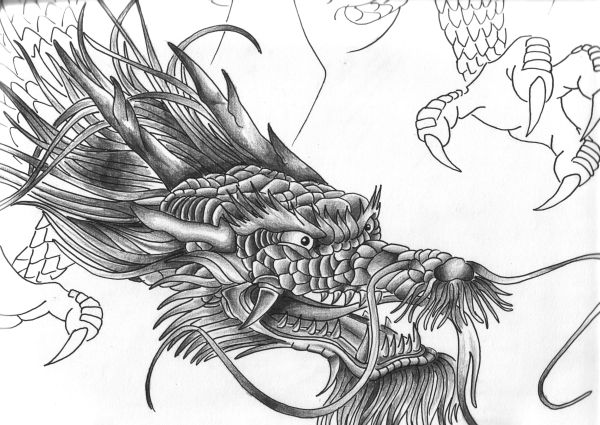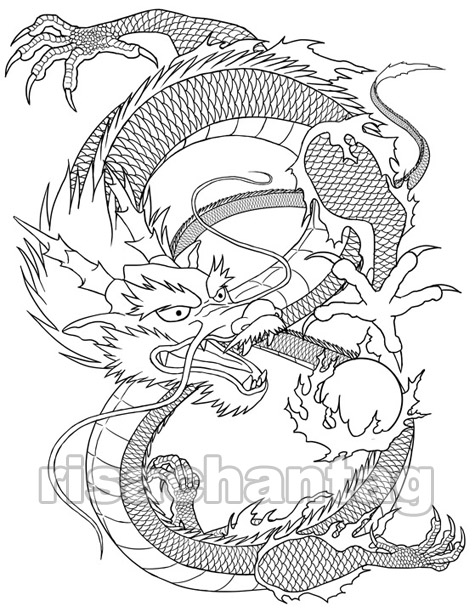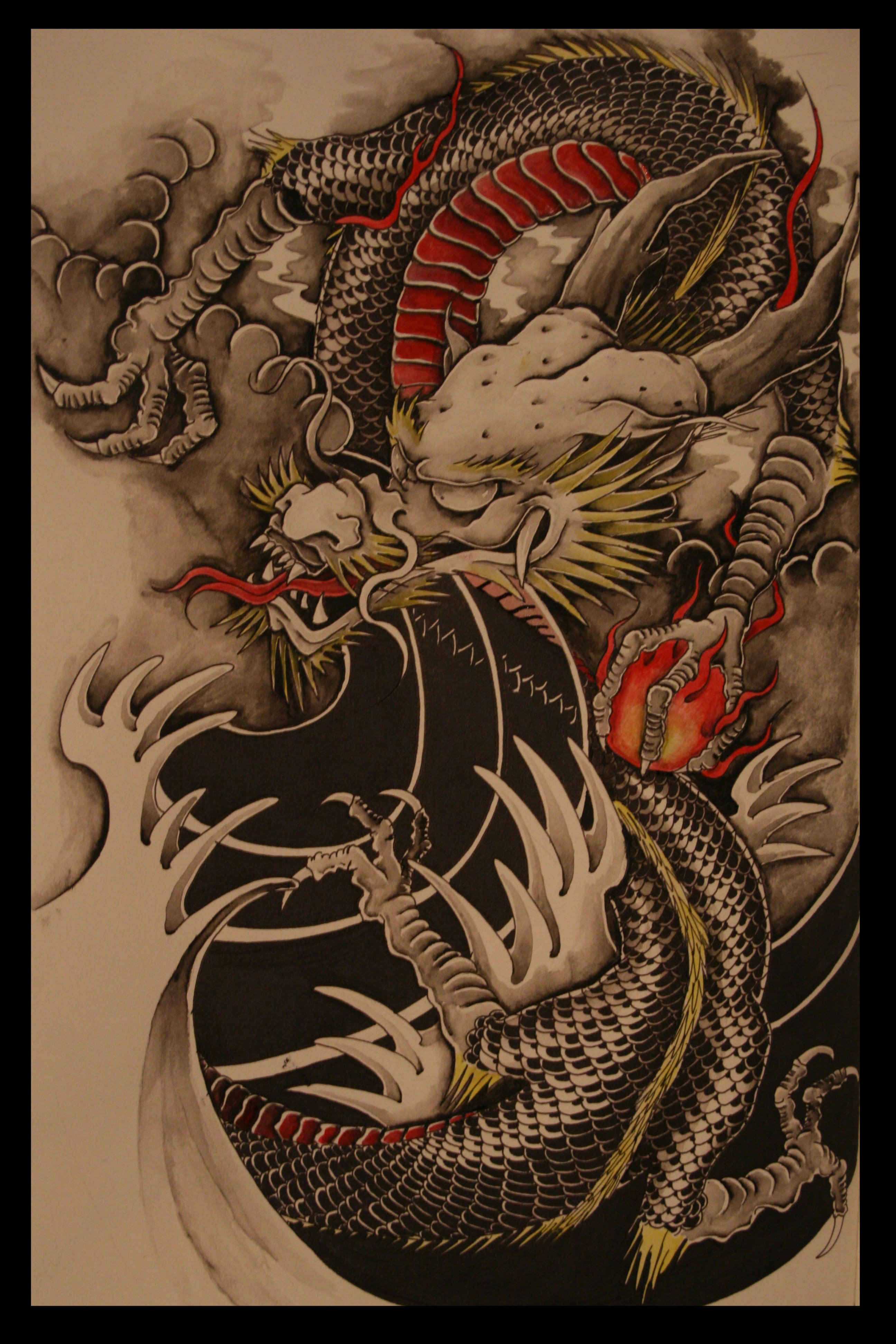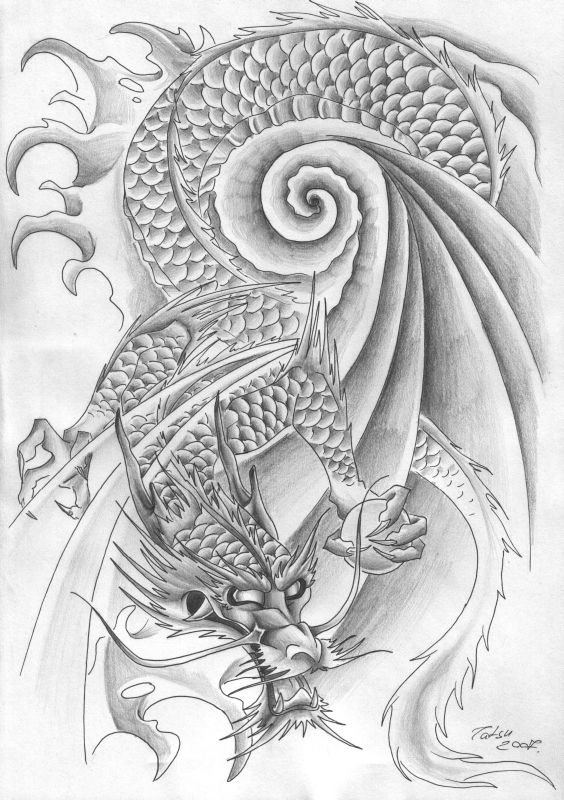Ads by Smowtion
Chinese Dragon Tattoo Gallery
By Fanyun Ding
Chinese dragon is a mythical divine beast originated from ancient Chinese folklores. It is now commonly depicted as a huge, serpentine, and scaled creature. Unlike "western dragon" that has been described as evil, Chinese dragon has long been symbolized as the power of auspice both in folklore and art. Created on the land of an agriculture-oriented country, Chinese dragon is believed to bring rain and water, which well explains the position it takes in Chinese culture.
For centuries, Chinese people proudly refer to themselves as "Long De Chuan Ren", or "Descendants of the Dragon". This ethnic identity is believed to originate from Huang Di, a benevolent, legendary emperor who was said to have been immortalized into a dragon. Since Huang Di is considered to be the ancestor of Chinese, hence the saying "Descendants of the Dragon".
Due to that Huang Di myth, Chinese dragon is also symbolized as an imperial power. For dynasties, emperors were referred to as "Long Zi" or "offspring of the dragon", who wore imperial robes with dragons drawn on and claimed to have a dragon birthmark as a divine authorization by heaven.
Chinese dragon is also among the 12 animals of the Chinese zodiac, a special Chinese way of designating years. To be more specific, year 2000,1988,1976,1964,1952 or any year with a 12-year gap between would be year of the dragon. In order to be "like a dragon", there are more babies born in the years of dragon than in any other animal years of the Chinese Zodiac.
Given all the foresaid reasons, it is not hard to understand why Chinese dragon is so popular among tattoo lovers. In fact, if you happen to be born in those dragon years, it's much recommended that you get a dragon tattoo because you are born blessed to be connected with Chinese dragon.
Basically, Chinese dragon is being tattooed in two forms: picture and character. Some prefer to have their whole back area tattooed with a vivid picture of dragon, while others may be satisfied with the Chinese character of "dragon" tattooed within a one-inch square of area. For dragon picture tattoos, a careful selection of the picture as well as the tattoo artist would be enough to ensure a quality dragon tattoo. For dragon character tattoos, however, it takes efforts to find a great tattoo idea, since you have to take many factors into consideration, including the literal meaning, the "actual" meaning, and the "cultural meaning" of the word that you select. Well, that's just the tricky thing of Chinese.
Fortunately, there are many Chinese phrases that associate with the idea of Chinese dragon. Followings are three dragon-related Chinese idioms for your reference.
Shen Long Ma Zhuang/ Long Shen Ma Zhuang
strong and energetic with an impressive bearing.
Both Shen Long Ma Zhuang and Long Shen Ma Zhuang are legitimate as an idiom, as in many cases Chinese characters can be reversed in words yet remain a similar meaning, just like this one.
Literally speaking, Shen means "magical, with divine power", Long means "dragon", Ma means "horse" and Zhuang means "strong". In Chinese culture, horse is considered intelligent, powerful and friendly to human, which therefore is used together with dragon in this idiom to describe the state of being strong and energetic.
By the way, Shen would be quite a nice character to ink alone, which could also mean "Almighty".
Ru Long Si Hu: valiant and energetic
Both Ru and Si means "like" in Chinese, so this idiom literally means "like a dragon like a tiger". Traditionally, Hu(tiger) and Long(dragon) are used together in phrases, idioms, and sayings to display a status of being strong, in power, and dominant. Needless to say, this idiom would be definitely fit for males since it's full of strength and masculinity.
What's worth noting, however, is that Long usually appears before Hu in expression, and it would seem weird when reversed. That being said, it would be a great idea to add Hu to your tattoo if your former choice was to ink Long alone, yet the right way to do this would be to ink "Long Hu", not "Hu Long".
Huo Long Xian Jian: strong and vigorous
Literally speaking, Huo means "alive", Long means "dragon", Xian means "fresh", and Jian means "healthy". When combined together, they form a unique Chinese idiom, one with a new and congruent meaning. Great literal meaning, great actual meaning, and great cultural meaning, this one is definitely fit for tattooing.
These dragon-related Chinese idioms are the literary and cultural embodiment of dragon and they truly live up to the standards of a unique and smart Chinese tattoo. It will be so amazing if you find one that best fits your personality. A Chinese tattoo dragon can be much more than an ink, but a special identity that helps you stand out of the crowd.
Chinese Dragon Tattoo Flash
By Declan O Reilly
Chinese Tattoos have always been hugely popular. At one stage they were the realm of criminals and the mafia. Now it seems even Hollywood celebrities seem to have caught on to the mystery and allure of the Far East. While it is undeniable that classic Chinese tattoos have an attraction which can easily be appreciated regardless of whether one can understand the often subtle meanings or not.

Aesthetics should be the primary consideration when getting tattooed, and Chinese characters are very well suited to this purpose. While tattoos have always been conversation pieces, Chinese tattoos add another element, since the typical viewer will probably ask you the meaning, which allows the wearer to not only translate the characters, but to explain the story behind the decision to make such a lasting statement.
Meaning is an important question however and for this reason can make Chinese tattoos date very quickly. Often it is not quite what the wearer was told by the tattooist at the tattoo shop or the meaning can become irrelevant after a few years.

Hopefully the person being tattooed has done his or her research and consulted with a native Chinese speaker about the meaning before being inked. Some non Chinese speakers have unwittingly tattooed their bodies with Chinese symbols which when translated become meaningless.
The most common Chinese tattoos are ones that are supposed to represent ideas and qualities like love or strength. Keep in mind that the concepts are aimed at English speakers, and on that level "peace, love and happiness" are easily understandable.

But before you run off to the studio to get one done you should do your research. Selecting a Chinese tattoos deserves careful study and attention. It should have less to do with style and more to do with your character, work, and values. It's permanent, so it's a pretty important decision in your life. In the end, it is important to choose something of lasting appeal not something faddish.

Chinese Dragons
For centuries, the Chinese dragon has been a symbol of power and mystery. Depicted in countless legends, both Eastern and Western, the dragon has provoked man to fear and worship it. In medieval Europe, it was a bloodthirsty, fire-breathing figure. Its malevolence and ferociousness struck terror in all. However, in Asia, it is the contrary. The mighty dragon is a mythical beast long celebrated for its benevolence, intelligence and good will. The Chinese dragon has been a common symbol of identity for Far Eastern cultures.

In fact, Chinese people all over the world are affectionately known as “lung de chuan ren”, or the "descendants of the dragon”. There are several distinct species of Chinese dragons. The Horned Dragon is considered to be the mightiest. The Celestial Dragon supports the heavens and protects the Gods. The Earth Dragon rules all of the earth. The Spiritual Dragon controls the wind and rain. The Treasure Dragon is the keeper of precious metals and gems. The Winged Dragon is the only dragon with wings. The Coiling Dragon dwells in the ocean. The Yellow Dragon is a hornless dragon known for its scholarly knowledge.
Chinese Dragon Tattoo Designs
By Graeme Wheeler
It is believed that the mythical creature developed its appearance from the totem poles of many different tribes in China. As the tribes merged, the different attributes of the dragon's appearance took shape. The Chinese dragon is believed to have evolved over time to incorporate the features of 9 animals to become the mythical creature it is today. These features include the:

• Horns of a deer
• Head of a camel
• Eyes of a demon
• Neck of a snake
• Stomach of a clam
• Scales of a carp fish
• Claws of an eagle
• Soles of a tiger
• Ears of a cow

Combine these features together and you have the Chinese Dragon, a very popular tattoo design over the ages and evermore so now.
It is common for many oriental pictures of the Chinese dragon to show a pearl or thunder-ball under its chin - representing good luck and wisdom. Some pictures also show Chinese dragons with bat wings, although dragons are able to fly without wings.
Chinese Dragon Tattoo Meanings
The Chinese dragon tattoo is centuries old which adds to its appeal and mystic. It is a symbol of mystery and power, wisdom and good will. These dragons are considered good luck and are linked heavily with the number nine, as there are nine sections to the dragon. Qualities include loyalty courage and strength.
The Chinese Dragon is a divine mythical creature that warded off bad spirits. They have a strong link with authority in China. The Chinese proclaim themselves "Long De Chuan Ren" or descendents of the dragon because when the first Emperor Huang Di died, (considered by the Chinese as their ancestor) legend has it that he turned into a dragon and rose to heaven. This lead to the Chinese dragon becoming a symbol of imperial authority and power. The five toed Chinese dragon was reserved for the emperor alone. Peasants wearing such a symbol would be put to death.

These creatures have 117 scales, 81 of these scales are yang (positive) and 36 are yin (negative), so the dragon is yang creature.
The legend states that dragons originated in China and spread throughout the region, getting as far as Japan. The Chinese dragons have five toes, the Korean dragons have four toes and as you get further away, such as Japan, the dragons have three toes. It was not possible for dragons to go any further than Japan and lose any more toes.
Chinese dragons are believed to have a controlling force over water, such as seas, rivers waterfalls and the like. Water spouts are associated with dragons rising. When droughts or floods occur, it was common for sacrifices to be offered to the dragons to appease them. Legend has it that dragons have the ability to burst clouds and bring down the rain. If they are angry, they can cause floods.
The beauty of the design, combined with the stunning red, black and green colors make the Chinese Dragon tattoo design very popular.

Did you know that one out of every five people regret their tattoo design, according to a recent Harris Poll. If you are thinking of getting a tattoo, don't make these common mistakes - with this free tattoo guide and a review of the top online tattoo galleries.
Juliette Lewis Concert in Paris
One thing I (and the blog writer) found funny was the comment on the venue's website: "A punk attitude that does not prevent her from being an active member of the Church of Scientology."
The blog writer said: "... some people have an odd idea of what a Scientologist is."
One of the reasons for strange ideas about Scientologists is this: "Where there is no data available people will invent it." L. Ron Hubbard (From the article: "Public Relations Series #18"). We do our best to provide true data about Scientology and Scientologists, but people are not always willing to spend the little bit of extra time needed to get to the truth, so they either make stuff up or grab onto the first piece of nonsense they come across (and the media is always very willing to provide a quick sound-bite of nonsense).
So Juliette is a punk rocker. What has that got to do with her being a Scientologist?
I like Gothic Metal, Death Metal and Operatic Metal does that prevent me from being a Scientologist?
Next time you hear some piece of nonsense about Scientology (like Scientologists Don't Believe in ...) please take the time to find the truth or just ask me: I will answer your questions about Scientology.
A culture is only as great as its dreams, and its dreams are dreamed by artists. — Scientology founder L. Ron Hubbard
Juliette Lewis In Her Own Words
Juliette Lewis is on-tour in the UK promoting her new album, Terra Incognita
This much I know: Juliette Lewis. The actress and singer, 36, in her own words
A culture is only as great as its dreams, and its dreams are dreamed by artists. — Scientology founder L. Ron Hubbard
Peaches Geldof - Scientologist
In a recent interview on British TV she revealed that she has been a Scientologist for a couple of years.
Here is a video of the interview:
A culture is only as great as its dreams, and its dreams are dreamed by artists. — Scientology founder L. Ron Hubbard
Celebrity Supporters of L. Ron Hubbard's Study Technology
Tom Cruise
 Drawing on the experiences that touched his life, award-winning actor Tom Cruise has shown a dedication for helping others in need. His areas of contribution range from mentoring and education to detoxification of rescue workers suffering from toxic exposure at Ground Zero.
Drawing on the experiences that touched his life, award-winning actor Tom Cruise has shown a dedication for helping others in need. His areas of contribution range from mentoring and education to detoxification of rescue workers suffering from toxic exposure at Ground Zero.
Tom is the co-founder of the 911 New York Firefighters' & Rescue Workers' Detoxification Program, which uses the Hubbard Detoxification Protocol. Co-founding the first facility and covering costs for many of the patients doing the program, he is engaged in raising money to establish an additional five clinics around New York.
As for his work in education, Tom is an activist and global ambassador for Applied Scholastics International. His work includes helping Applied Scholastics establish their 100-acre international teacher training institute and headquarters in St. Louis, Missouri.
As well, Tom's relentless support of the Hollywood Education & Literacy Project (HELP) has changed the lives of more than 5,000 young people. For his work as a mentor for youth and as a Founding Board Member of HELP, Tom was honored by the National Mentoring Partnership with their Excellence in Mentoring Award in 2003.
Tom's story:
“When I was about seven years old, I had been labeled dyslexic. I would go blank, feel anxious, nervous, bored, frustrated, dumb. All through school and well into my career, I felt like I had a secret.
“I was introduced to the writings of L. Ron Hubbard… and everything fell into place. I had a lot of catching up to do, but that was it! I realized I could absolutely learn anything that I wanted to learn.
“I don't want people to go through what I went through. I want kids to be able to solve life's problems.”
A culture is only as great as its dreams, and its dreams are dreamed by artists. — Scientology founder L. Ron Hubbard
Erika Christensen in Parenthood

The show will be exec produced by Jason Katims, writer of "Friday Night Lights", and by the power duo of Ron Howard and Brian Grazer of Imagine. Also starring in the show is Lauren Graham of The Gilmore Girls (my wife's favorite show of all time).
A culture is only as great as its dreams, and its dreams are dreamed by artists. — Scientology founder L. Ron Hubbard




